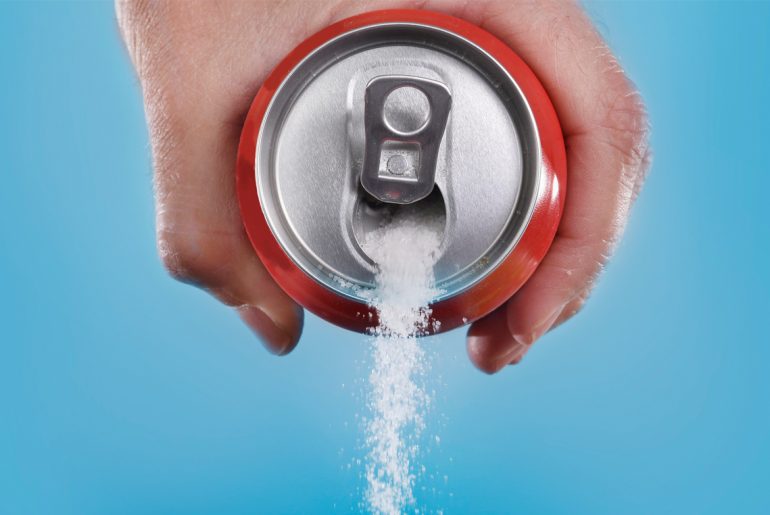It’s unfair that heart-healthy February falls right when we’re reaching for cold weather comfort food. But this inconvenience reminds us that we need to stay vigilant all year long — not just when it’s convenient. According to the CDC, heart disease is the leading cause of death for both men and women. About 1 in every 4 deaths in the United States is the result of heart disease. But it’s not just what you eat that affects your heart health. It’s also when you eat. A scientific statement released by the American Heart Association says that there is reason to believe, that the timing of our meals matters a lot when it comes to cardiovascular disease. The conclusion: Eating earlier is better. The body maintains its own internal clock, so eating later can reset that rhythm and alter metabolism. “Meal timing may affect health due to its impact on the body’s internal…
How much sugar should you really allow your kids?
For kids, Easter morning means one thing — a big basket of candy. It’s a part of many childhoods — the egg dying, wearing your Sunday best, and biting ears-first into a giant chocolate rabbit. You try to limit your kid to just a few handfuls of jelly beans, but you turn your back for five minutes and they’ve devoured enough candy to fuel their whole year. While the candy-coma isn’t an actual medical condition, an excess of sugar and sweets can definitely take a toll on your child’s health. According to the American Heart Association (AHA), children shouldn’t have more than 3-6 teaspoons (12-25 grams) of added sugar per day. Eating too much sugar can actually make us crave more sugar, which can ultimately lead to everything from cavities, to obesity, and heart disease. In line with the AHA, the World Health Organization recommends that “free sugars” (sugars from…
6 unexpected factors that put you at risk of heart disease
Every 60 seconds, a women will die from heart disease in the U.S., according to the American Heart Association. Heart disease is the number one killer of women (and men) in America, but it’s not always just giving up cigarettes and stepping away from donut box that will save you. It’s a little more involved than that. It is true that the biggest risk factors for heart disease are obesity, lack of exercise, smoking and high blood pressure, according to the AHA, but as a women, there are other factors than increase your risk of blocked arteries as well. Little did you know that when you were growing up, your likelihood for developing heart disease was beginning to form. While you couldn’t decide at what age you got your period or whether you’ve had heartbreak, you can avoid other lesser-known stressors like diet pills. February is Heart Healthy Month, and if you’re serious…
Enjoying spicy foods linked to lower blood pressure
People who eat spicy foods may have a heightened sensitivity to the taste of salt, a new study suggests. The findings were recently published in the journal Hypertension and show there is reason to believe eating spicy foods may help people consume less salt. Eating less salt means lower blood pressure and better health for millions of people. According to the World Health Organization (WHO), people are eating too much salt in all corners of the world. The recommended daily salt intake is less than 5 grams, but most people consume somewhere between 9 and 12 grams. The WHO estimates that 2.5 million deaths could be prevented each year if salt consumption was reduced to the recommended levels. The health issue prompted Zhiming Zhu, M.D., professor of cardiovascular medicine and metabolism at the Chongqing Institute of Hypertension in China to pursue alternatives to salt. Zhu and his team decided to study spicy food…
Kind Bar dumps 45,000 pounds of sugar in Times Square to show childhood health trend
KIND snack company is shedding light on just how much extra sugar children consume, by creating a 45,485 pound pile of sugar in Times Square. The 45,485 pounds represent the amount of sugar American children consume every 5 minutes. The American Heart Association recommends children eat or drink less than six teaspoons of added sugars per day. Six teaspoons of added sugar amounts to about 100 extra calories, or 25 grams, per day. But the average amount is nearly triple this recommendation. Many children consume more than 270 calories from added sugars each day according to the 2015-2020 Dietary Guidelines for Americans. Much of this comes from fruity beverages and soft drinks. Artificial sweeteners aren’t without consequence either. “Hopefully it empowers consumers — especially parents — to make informed food choices,” Stephanie Perruzza, RD & Wellness Specialist at KIND told USA Today. Eating foods high in sugar during childhood has been linked to the…
New American Heart Association Study Warns Against Coconut Oil
Superfood fans take caution. The American Heart Association recently released a report advising against consuming coconut oil. Coconut oil has seen a growing following in recent years as fans viewed it as an almost miracle-like fat and butter alternative, particularly with the paleo set. Touted as a superfood, cooking with the waxy white solid was said to burn fat, kill harmful microorganisms, curb hunger and improve cholesterol levels. But researchers recently found that coconut oil increased LDL (“bad”) cholesterol in seven out of seven trials, and they failed to see a difference between coconut oil and other popular oils high in saturated fat like butter, lard and beef fat. In fact, 82 percent of the fat in coconut oil is s saturated, while butter (63%), beef fat (50%) and pork lard (39%) contain less. Frank Sacks, lead author on the report, said he has no idea why people think coconut oil is healthy — I’s almost…
Diet Sodas Linked to Increased Risk of Dementia and Stroke, Study Finds
Given everything we’ve been told about sugar being bad for us, you might think reaching for the “diet” or “sugar-free” option is the smarter choice. But you’d be wrong. According to a new research published in the American Heart Association’s (AHA) journal Stroke, the sweeteners used in these alternative beverages are linked to higher rates of stroke and a risk of developing dementia among consumers. The April 2017 study asked more than 4,000 participants, three times each over a span of seven years, about their eating and drinking habits during that time. Over the next 10 years, the researchers continued to follow the participants’ health records and tracked which among them had strokes or developed dementia. Researches found that those participants who consumed at least one artificially sweetened “diet” or “sugar-free” drink per day — whether soda or juice — were nearly three times more liked to suffer a stroke…







